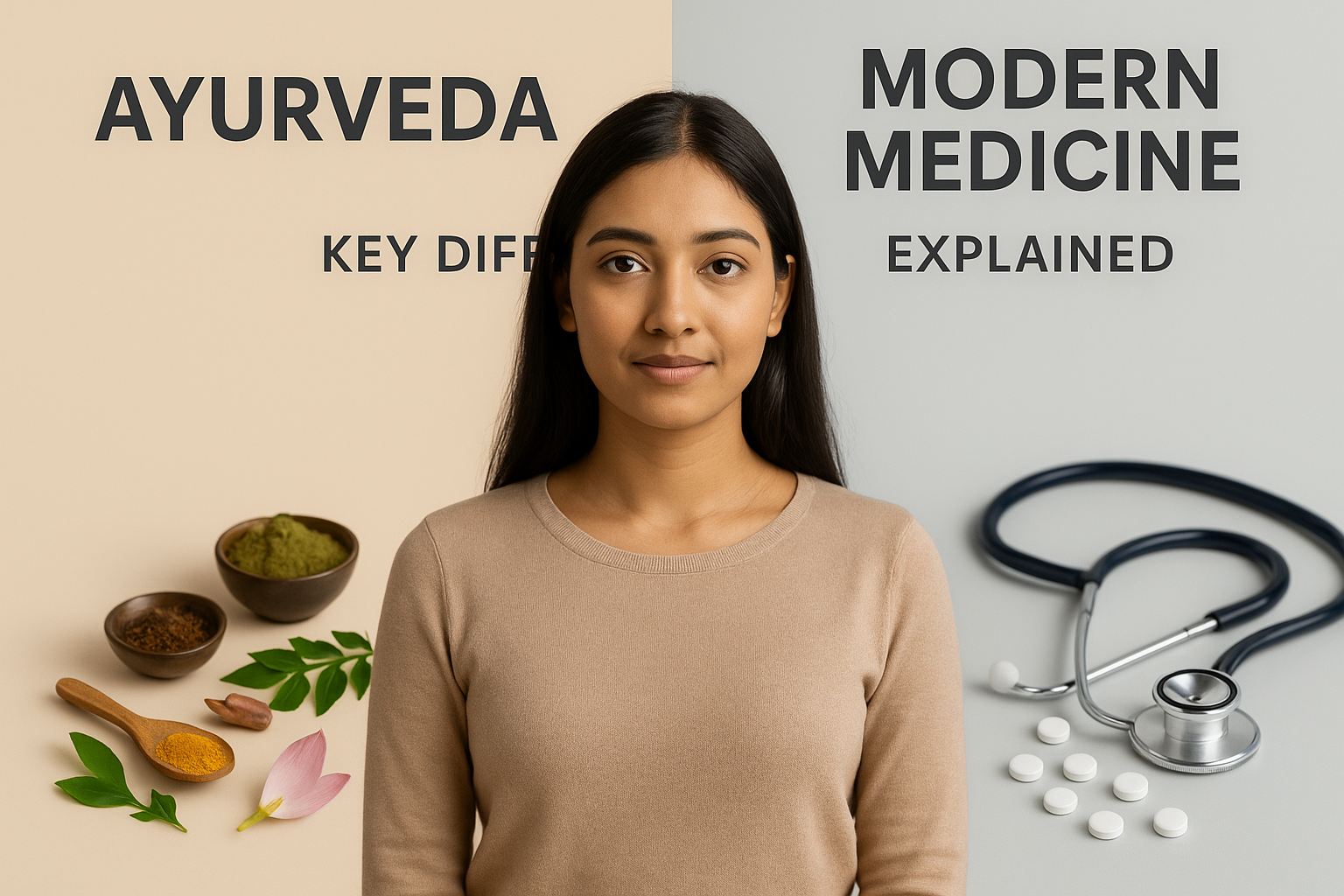Ayurveda vs. Modern Medicine is a comparison many people make when they want comprehensive, long-term health. Both aim to improve quality of life, yet they differ in philosophy, methods, and timelines. Ayurveda prevents and treats disease by addressing the root cause, while modern medicine excels at rapid, symptom-focused relief—especially in acute or emergency situations. Used wisely, they can complement each other.
Ayurveda in the Ayurveda vs. Modern Medicine Debate
Ayurveda—“the science of life”—is a traditional medical system from India that’s more than 5,000 years old. It centers on balancing the three doshas (Vata, Pitta, Kapha) and viewing body, mind, and spirit as an integrated whole. Importantly, Ayurveda isn’t only preventive; it is also curative, using personalized diet, herbal medicine, lifestyle routines (dinacharya), cleansing therapies like panchakarma, yoga, and breathwork (pranayama) to correct imbalances at their source. A key branch, Rasayana, focuses on rejuvenation, longevity, and sustained vitality—even for otherwise healthy individuals.
Modern Medicine in the Ayurveda vs. Modern Medicine Comparison
Modern (allopathic) medicine relies on scientific research and advanced technology to diagnose and treat disease. It is extraordinarily effective for urgent care, infections, trauma, and complex surgeries. Treatments typically include pharmaceuticals, surgery, targeted therapies, and clinical rehabilitation. While modern medicine often prioritizes symptom management and fast stabilization, many clinicians also investigate underlying mechanisms—especially in chronic disease—through evidence-based protocols and diagnostics.
Ayurveda vs. Modern Medicine – Core Differences
- Approach to Health
- Ayurveda: Both preventive and curative; restores balance by treating the root cause behind symptoms.
- Modern Medicine: Primarily curative and symptom-oriented for rapid relief, crucial in emergencies.
- Treatment Methods
- Ayurveda: Individualized nutrition, herbs and minerals, panchakarma, yoga, pranayama, meditation, massage, and lifestyle correction.
- Modern Medicine: Medications, surgery, imaging-guided procedures, radiation, and physical/occupational therapies.
- Diagnosis Lens
- Ayurveda: Dosha assessment, pulse and tongue analysis, digestion and elimination, sleep, emotions, and daily habits to locate the origin of imbalance.
- Modern Medicine: Lab tests, imaging, biomarkers, and clinical examinations to classify disease and guide standardized protocols.
- Timeline & Outcomes
- Ayurveda: Gradual yet sustainable results; aims to prevent recurrence and build resilience.
- Modern Medicine: Often rapid results, especially for acute or life-threatening conditions.
- Rejuvenation & Quality of Life
- Ayurveda: Explicit focus on Rasayana—rejuvenation, healthy aging, cognitive clarity, and long-term vitality.
- Modern Medicine: Quality-of-life gains through pain control, mobility restoration, and disease-specific rehabilitation.
Ayurveda’s View on Daily Responsibility for Health
In Ayurveda, health is the cumulative result of your daily choices. Taking responsibility isn’t about blame—it’s about consistent, compassionate ownership of routines that either nourish or deplete you. Small, repeated actions become powerful medicine:
- Food & Digestion: Eat mostly fresh, suitable-for-your-dosha meals; favor regular mealtimes and mindful eating.
- Sleep & Rhythm: Keep steady sleep/wake times; prioritize wind-down rituals.
- Breath & Mind: Include pranayama and brief meditation to regulate the nervous system.
- Movement: Choose daily movement that balances your current state (e.g., grounding for Vata, cooling for Pitta, stimulating for Kapha).
- Senses & Tech: Create calm in your environment; set boundaries with screens and overstimulation.
- Self-Reflection: Track how choices affect energy, mood, digestion, and pain—then adjust.
This daily responsibility is how Ayurveda converts insight into results. Over time, your routine becomes the therapy that maintains balance and prevents relapse.
Can Ayurveda and Modern Medicine Work Together?
Absolutely. Many people benefit from a combined plan. For instance, someone with chronic digestive issues might use modern diagnostics and targeted medication while adopting Ayurvedic diet, herbs, and stress-regulation practices to resolve the root imbalance and reduce flare-ups. Collaboration with qualified professionals from both systems can yield safer, more comprehensive care.
Conclusion
Ayurveda vs. Modern Medicine is not a contest—it’s a complementary relationship. Modern medicine provides precision and speed when you need it most. Ayurveda offers root-cause correction, rejuvenation, and daily practices that sustain health. Taking responsibility for your everyday choices is the bridge that brings both worlds together for a more complete, resilient well-being.

